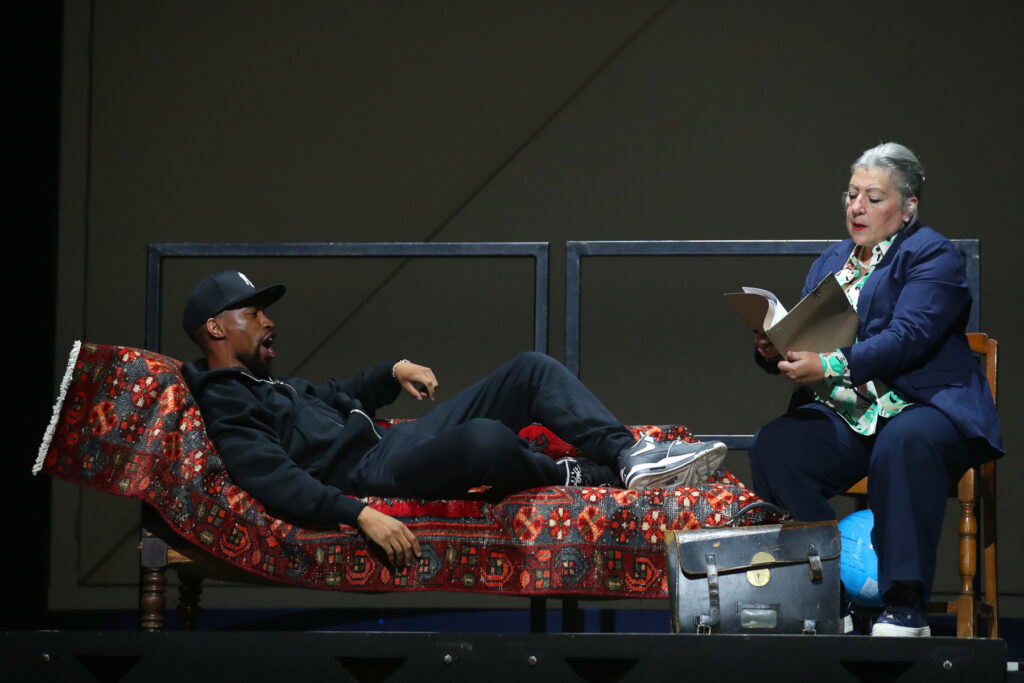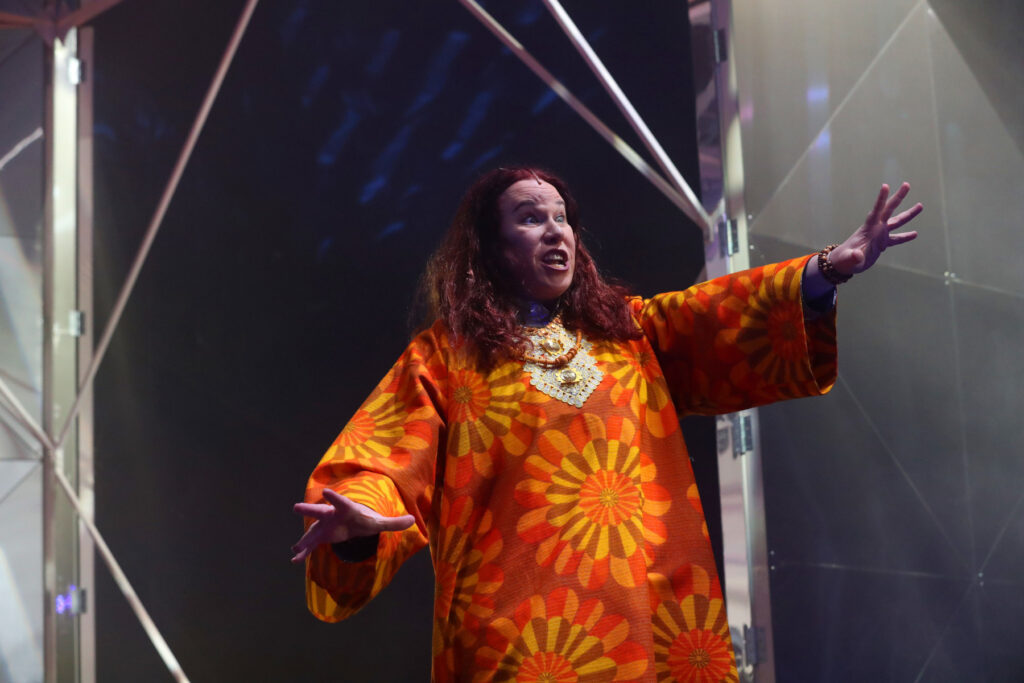Tippett’s last opera New Year (premiered at Houston in 1989, given at Glyndebourne the following year and apparently not staged in this country since) looks forwards and backwards as its title might imply. It does so, however, not to any specific period immediately before or after the point of its composition or whenever its setting might be, but allegorically from ‘Somewhere and Today’ to ‘Nowhere and Tomorrow’. Such fuzzy, quasi-sci fi concepts will probably either enthral or exasperate depending on one’s susceptibility to such utopian ideas. It’s fair to say that the composer’s own libretto doesn’t help, which tends to comprise a string of portentous platitudes rather than a more subtly woven narrative or dialogue. The turns of phrase may have sounded meaningful in his mind or when committed to paper, but in performance they seem cliched, even corny. Maybe with so much that has been promised and frustrated since the late 1980s (even Francis Fukuyama has rowed back on ‘End of History thesis), we are now more cynical about the likelihood of productive change and progress. But a more literary, experienced hand might have made of the text something more poetically sustained and coherent. Even considering the work’s symbolic scenario that is traversed before the conclusion (drawing upon similar psychoanalytical tropes as had been used in his previous operas) the ‘universal dream’ proclaimed at the end might have been something more nuanced than simply ‘one humanity, one justice’.
Nothing dates more quickly than a vision of the future; its incursion into the opera’s Somewhere and Today by Merlin, Pelegrin, and Regan on a spaceship, and brandishing a computer, as though these are rather new-fangled things, makes the work seem quaint now. But in a more general sense, the feeling of trepidation about the brave new world of technological innovation and future change is as pertinent as ever, as we stand on the cusp of a new world order dominated by AI. Jo Ann’s agoraphobic desire for a quiet time in the safety of home, while Terror Town outside grows increasingly disturbed and frightening to her, will perhaps resonate with us all after emerging from the unprecedented experience of Covid lockdowns into an increasingly unstable, troubled world outside. Tippett’s conceiving of Jo Ann’s foster brother, Donny, as a Rastafarian and being cast here (by a black singer) as a rapper in line with the Afro-Caribbean style of some of his music (including a rap-like duet with Regan) reminds us that, possibly, race relations aren’t a great deal better now than they were in 1989. When Donny is ritually beaten by such emblems of authority as a teacher, an ecclesiastical cleric, a besuited professional or parent, overseen by a wicker man, we can’t help but think of the victimisation and violence which sparked off the widespread Black Lives Matter demonstrations in 2020.

All that is dramatised vividly in Keith Warner’s production of the opera with Birmingham Opera Company, at the huge circus-like Dream Tent at Smithfield, Birmingham. For once the overused term ‘immersive’ is aptly applied here, as we stand below, in the midst of the orchestra on a platform to one side, and the chorus on another, free to move between them from one end of the tent to the other – between Jo Ann and Donny’s suburban home (like a Wendy house with diaphanous facades, complete with prissy net curtains) and the cube which reveals itself as the spaceship from Nowhere and Tomorrow. Halfway along is a circular dais, mediating between those two spheres of activity – between past and future – as the characters flit from one to the other, their process of transition and development taking place for the audience in the round.
The cast of singers thrive in the wide-open space of the Dream Tent, commanding the acoustic rather than being subdued by it. Francesca Chiejina develops a confident musical personality, even in the fearful seclusion of her life at home before her encounter with Joshua Stewart’s stalwart Pelegrin, who leads her to the fountain of forgetting and the lake of remembering, before they exchange a rose, and she is ready to proceed into the world at large. Sakhiwe Mkosana is an ebullient, feisty Donny, who essentially becomes the sacrificial victim at the pivotal ritual of New Year (complete with a rendering of Auld Lang Syne in Tippett’s score) enabling the progression from the past into the future. In Act Three the part is taken up in a more stentorian, sonorous fashion as ‘Donny’s Spirit’ by Shaun Cope. As their foster mother, Nan, Sarah Pring expresses herself with a broad vibrato that sounds almost otherworldly, but certainly hints at an anxious solicitude rather than a nagging, strict temper.

When the future appears with Merlin in the spaceship from Nowhere and Tomorrow, his angular lines strike a firm, heroic contrast with the other characters’ more chant-like vocal writing up to that point, in Lucia Lucas’s bold and assured performance. Samantha Crawford soars as his and Pelegrin’s boss Regan (an ironic allusion to King Lear’s cruel daughter, or perhaps the then very recent US president?) – metallic and strong (clad in an all-in-one dappled plastic suit) and often on the verge of issuing into coloratura, as though a Queen of the Night or the fearsome heroine of a Baroque opera. ‘Outside the Action’ are the Presenters (Tippett’s single part divided in two here), whose roles are delivered with the stagey declamation of a compère, as they announce at the beginning what is to happen and comment on the action, like a Greek chorus, on a few subsequent occasions.
On paper, Tippett’s use of electric guitars, saxophones, and a battery of percussion looks like a classical composer’s gimmicky attempt to use the sonorities and styles of other genres of music and appear with it. In practice they work well as alternative timbres, enhancing those of a standard orchestra, just as composers have long sought to extend their instrumental palette when desired. And the diversity of styles and allusions folded into the music succeed by the force of Tippett’s eclectic musical personality, as they do in his other stage and dramatic works (he even quotes from his own The Mask of Time). Undoubtedly the enthusiasm of Alpesh Chauhan and the City of Birmingham Symphony Orchestra help enormously in keeping it all together with energy and diligence. Where the music could become impulsive and intrusive it remains supportive to the singers, and is purposeful, driven by alert rhythm and the sense of dance that is never far away, even when not deliberately written into the score. The Birmingham Opera Company Chorus give an especially resounding performance as the disaffected citizens of Terror Town and then the Newcomers, experienced all the more viscerally by us in the audience when positioned so closely to them.
Whatever the shortcomings of the work itself, this is a novel and exciting way to encounter this or any opera.
Curtis Rogers
New Year
Composer and Librettist: Michael Tippett
Cast and production crew:
Jo Ann – Francesca Chiejina; Donny – Sakhiwe Mkosana; Nan – Sarah Pring; Merlin – Lucia Lucas; Pelegrin – Joshua Stewart; Regan – Samantha Crawford; Presenters – Grace Durham and Oskar McCarthy
Director – Keith Warner; Designer – Nicky Shaw; Lighting Designer – John Bishop; Video Designer – Matt Powell; Dramaturg – Ty’rone Haughton; Birmingham Opera Company Chorus; City of Birmingham Symphony Orchestra; Conductor – Alpesh Chauhan
The Dream Tent, Smithfield, Birmingham, Wednesday 10 July 2024.
Top Image: Francesca Chiejina as Jo Ann.
All photos by Adam Fradgley courtesy of Birmingham Opera Company.